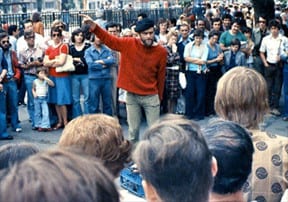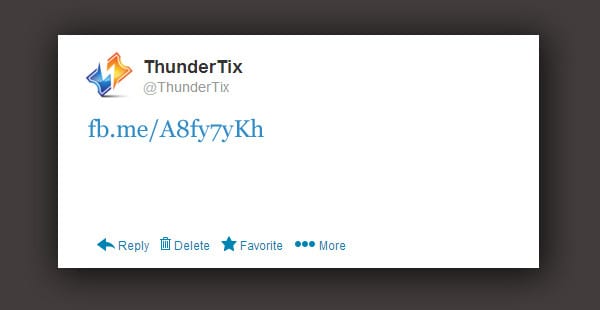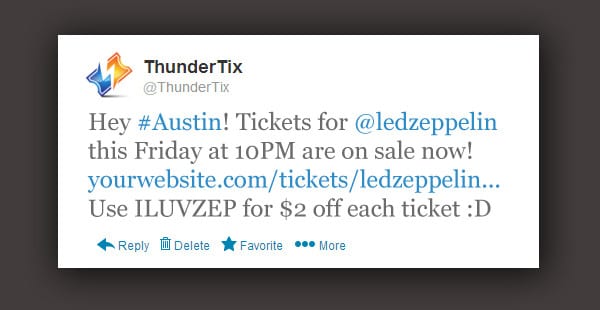
Twitter's IPO has the investment world salivating over the popular social network's potential to generate billions in profits. And just like when Facebook became a publicly traded company, the Twitter IPO is causing a rash of new user sign-ups. Many new Twitters users are unaware of the etiquette for how go about promoting events correctly. For the venue owners new to Twitter, here are some best practices for the coveted social ticket sales.
Executive summary
- Create more value than you capture and share what is of interest to your Twitter followers.
- Don't use scheduled tweet services.
- Always include context (event dates, times, etc.) in self-promotion tweets.
- Link directly to the webpage where tickets are purchased.
ThunderTix offers many other Ticketing 101 blog posts.
10:1 - The Golden Ratio
Twitter has published extensive guidelines on behavior for both regular folks and businesses. Twitter beginners are encouraged to read the official documentation when they have the time. But if a venue owner is in a hurry, there is actually a simple way to approach self-promotion using a "golden ratio."
You should tweet ten times about something other than yourself for every one self-promotion tweet, a ratio of 10:1.
Some professional marketers may balk at a 10:1 ratio, as they consider Twitter's sole purpose to be a Mad Men-style advertising medium. However if one looks to the companies reaping the most from their Twitter campaigns, one will see a healthy mix of selflessness and self-promotion (along with a little humor). Tim O'Reilly calls this "creating more value than you capture."
As an example, if a nightclub that books rock bands were to follow the 10:1 ratio, approximately ten tweets should be about popular bands in the same genre (even ones not booked to perform at the nightclub), new music releases, concert photos, etc. After consistently sharing interesting things, then publish that all important tweet of self-promotion. Being a trusted source of information about rock music will endear the nightclub to its Twitter followers. Venues owners that make a real effort to be part of the larger culture their customers enjoy will find the long term benefits of social media.

Standing on a soapbox yelling at people - this is NOT how Twitter works
Not observing the 10:1 ratio is the most common mistake venue owners make when they first start using Twitter. Your goal is ticket sales - as it should be - but ticket sales are not the goal of your followers. Participation is what make social network such a powerful medium. And there is nothing participatory about standing on a virtual soap box and yelling "Buy my stuff! Buy my stuff!" while ignoring what is important to others.
Don't Use Scheduled Tweets
There are several Twitter apps that let you write a series of tweets in advance, then set a time for them to be published. That may sound like a very productive way of using Twitter, but it has come back to haunt many businesses big and small. It seems like every few weeks another company finds itself mired in controversy because of scheduled tweets.
The problem stems from the human habit of making associations between disparate things. There may be a tragic turn of events somewhere in the country, an awful act of violence or a cruel injustice, and should that bad news coincide with the release of a scheduled tweet, a venue's followers will make an association.
Earlier this year, a lapse in good judgement by communications giant AT&T resulted in a tidal wave of negative PR.
Venue owners and event managers just starting who are new to Twitter should simply not make use of any scheduled tweet services at all. For those with more experience, industry expert Casey Waltz says it's essential that companies turn off scheduled tweets when an emergency or tragedy occurs. A self-promotional tweet automatically published during a crisis is perceived as insensitive and even crass. There are some extreme examples of scheduled tweets going very, very wrong for businesses, but decorum dictates the salacious circumstances not be mentioned in this post.
Anatomy of Social Ticket Sales
Don’t let the scandal and bad PR from scheduled tweets scare you into thinking Twitter is not an exceptional business tool - it is.
Correctly formulating a self-promotion tweet starts with sharing contextual links, or URLs. All too often, venues will add links to tweets that either misdirect a would be ticket buyer or worse, route the follower to a marketing website or other third party service that is effectively a dead end.

One of the misused features of Facebook is the ability to connect it to a Twitter account. Doing so is perceived as a time saver, but those new to Twitter may forget about the 140 character limit. If the Facebook post that is automatically sent to Twitter doesn't get around to any event details in the first sentence, the venue’s Twitter followers will see basically nothing. Assuming Twitter followers will make the effort to decipher a malformed tweet is unwise. Cultivating a loyal following on Twitter means treating people with respect and being the source of worthwhile information. Every tweet counts, be it self-promotion, or just sharing something that is interesting or fun.
Other malformed self-promotional tweets are ones that are missing contextual elements such as a performer's Twitter username (“@ledzeppelin”) if available, and not including the event date and time. Simply tweeting a raw link to the website,and nothing else, is the most egregious of all.

One must remember that Twitter followers are viewing a screen filled with hundreds of other tweets, each vying for attention. Simply adding “Tonight at 10PM...!” or “This Friday...!” to a tweet provides context at a glance. Your followers know if they have Friday night open and are looking for something fun to do, so meet their needs with an abbreviated show date/time in your tweet . The slang term for tweets that contain a link and little or no context is "Russian roulette," with all the negative connotations therein.
Then there is the link itself - the destination you are sending your would-be ticket buyer to buy tickets (ex: your website). If the self-promotion tweet is about a specific event, and your website has multiple events listed, make sure the link you share goes directly to the webpage for the event. Countless studies have shown that the attention span of the average consumer is mere seconds. Big retailers know that once they have the attention of a consumer, the means to make a purchase needs to be presented immediately. Tweeting that a popular band is playing at your venue, but adding a link to a long list of other performances may cause the follower to give up and not buy tickets (aka "tl;dr"). It is not only good etiquette to share contextually correct links, it is good business.
ThunderTix Social Ticket Sales
Using Twitter to generate additional ticket sales is worth your time, but don't go it alone. Choose a ticketing software that has social sharing baked right in.
When you choose ThunderTix as your online ticketing software, you get multiple ways to ignite social ticket sales. Every call to action you make in a tweet will drive would-be ticket buyers to your site. Once there our technology powers the transaction process and culminates with the all-powerful Twitter share button.
We like to call social sharing a “perpetual dynamo”, meaning the simple act of one ticket buyer sharing the excitement they feel with others causes their friends and family to buy tickets to the same event. If you have questions about the potential of social sharing, or are in a hurry to start selling tickets online, you are welcome to contact us and we’ll take care of you right away.
Be sure to take a look at our other features and sign up for a free trial today!
Image source: Wiki Commons